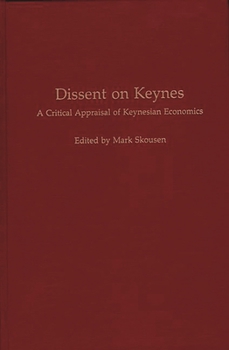Dissent on Keynes: A Critical Appraisal of Keynesian Economics
Keynesian economics is not dead but is alive and kicking in the U.S. and elsewhere. However, Keynesian economics has caused the U.S. and other countries under its influence to suffer inflation, economic instability, excessive debt, overconsumption, and underinvestment on a serious scale. Meanwhile, many Far Eastern and European countries have rejected Keynesian-style economics and are rapidly surpassing the U.S. in economic growth. This edited volume is the first and only modern work to attack Keynesian economic theory, which is at the root of many of the U.S. economic problems.
The contributors of this volume analyze the main tenets of Keynesianism--the multiplier and accelerator, the Phillips curve, the paradox of thrift, Keynesian development theory, progressive taxation, deficit spending and countercyclical demand policy, and post-Keynesianism. They demonstrate that it represents not only bad economic policy but bad economic theory, fraught with fallacies and errors. The work also offers a revisionist view of Keynes, the man, both as an economist and an investor.Format:Hardcover
Language:English
ISBN:027593778X
ISBN13:9780275937782
Release Date:March 1992
Publisher:Praeger
Length:264 Pages
Weight:1.13 lbs.
Dimensions:0.8" x 6.0" x 9.3"
Customer Reviews
0 rating





